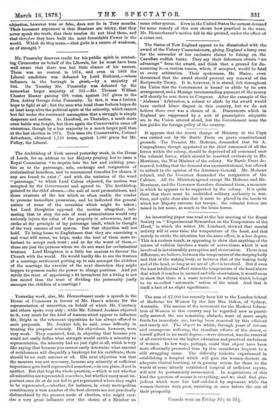The Archbishop of York moved yesterday week, in the House
of Lords, for an address to her Majesty praying her to issue a Royal Commission "to inquire into the law and existing prac- tice as to the patronage, sale, exchange and resignation of ecclesiastical benefices, and to recommend remedies for abuses, if any are found to exist ;" and with the omission of the word " patronage," to which Lord Cairns objected, the motion was accepted by the Government and agreed to. The Archbishop pointed to the chief abuses,—the sale of next presentations, and those evasions of the law which so often enable the vendor to, promise immediate possession, and he indicated the general nature of some of the securities which might be taken ; but Lord Houghton opposed the motion altogether, inti- mating that to stop the sale of next presentations would very seriously injure the value of the property in advowsons, and so strike at the principle of lay patronage itself, which he thought of the very essence of our system. But that objection will not hold. To bring home to Englishmen that they are exercising a real trust will never, we hope, make the best of them more re- luctant to accept such trust ; and as for the worst of them,— these are just the persons whom we do not want for ecclesiastical trustees. Lord Houghton is a little too anxious to flavour the Church with the world. He would hardly like to see the trustees of a marriage settlement putting up to sale amongst the children of the marriage the exercise of the next discretion they might happen to possess under the power to charge portions. And yet surely the trust of appointing a fit incumbent for a living is not less sacred than the trust of dividing the personalty justly amongst the children of a marriage ?


































 Previous page
Previous page